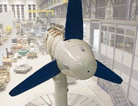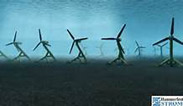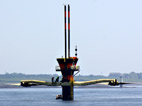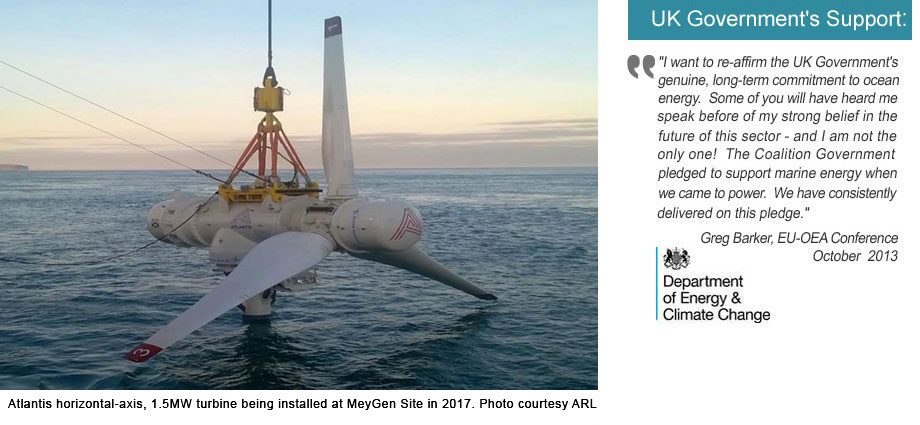
Tidal-Stream
Since the first commercial generation of electricity in the late 19th century, scientists and engineers have responded to the need to consume ‘non-renewable’ energy sources in order to generate electricity. However, non-renewable energy sources (e.g., fossil fuels) are finite and produce CO2, SO2, as well as other pollutants into the Earth’s atmosphere, e.g. further oxidation of SO2, usually in the presence of a catalyst such as NO2, forms H2SO4, and thus acid rain.
In its simplest form, the generation of electricity can be described as the conversion of energy from one form to another through a combination of either chemical and/or mechanical means. In the case of water-powered generators, the process involves the conversion of hydrostatic energy to kinetic energy, then to electrical energy.
The hydro-electric concept is by no means new and many successful projects have been completed over the last 100-years to successfully harness energy from rivers and oceans, capturing and converting this natural, sustainable, renewable energy resource into electrical energy. TTG technology and pilot testing has been studied for more than 35 years in the UK, which started its first utility-scale tidal energy project (the 1.2MW SeaGen ‘S’ device) in 2008. Since that time, the tidal industry has continued to grow and in 2014, Atlantis announced the development of its MeyGen site in the UK. MeyGen is the world’s largest, government-approved, tidal-stream tidal turbine array, approved to a maximum TTG output of: 398MW, and which began by installing 4 x 1.5MW TTGs in 2016. The MeyGen site will continue to be progressively expanded and is scheduled for completion by 2026.
The UK still leads the world in ocean energy power generation and UK utility companies are involved with the development of additional offshore sites around the British Isles – these are projects presently under development that will deliver >500MW installed capacity in the near future. Major utility companies such as Scottish Power and RWE have interests in a number of tidal energy projects. The presence of and recent commitments from major electrical utility companies and equipment manufacturers in this sector indicate that they have identified zero-emission, ocean-energy power generation as a future growth sector within the renewables industry and a valuable market to be involved in.
The following tidal and wave activity graph show how advanced the UK has developed compared to other countries:
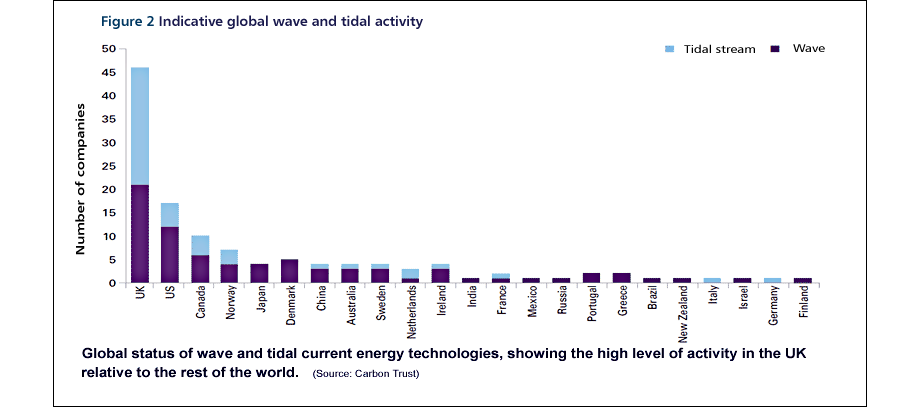
Our UK-based engineering study and design specialists and partners have worked on more than half of the UK tidal energy projects to date and international clients for renewable energy projects reach as far as Japan. Our study experience includes conceptual and front end engineering design, detail design, project management, consenting and development, procurement management, through to offshore installation. We have extensive experience managing major offshore installation projects in SEAsia and globally with an in-depth understanding of the challenges that face our Clients, ranging from technical issues through to and including the assessment and commercial feasibility of projects.
Like other significant low-carbon energy development projects, the definition and construction of an ocean energy power-generation project requires proper prior planning with full concept definition and integration of the different elements of technical expertise with professional project management, backed-up by funding and robust government policy support throughout the development phases.
TYPICAL STUDY METHODOLOGY TO DETERMINE CONCEPT DEFINITION
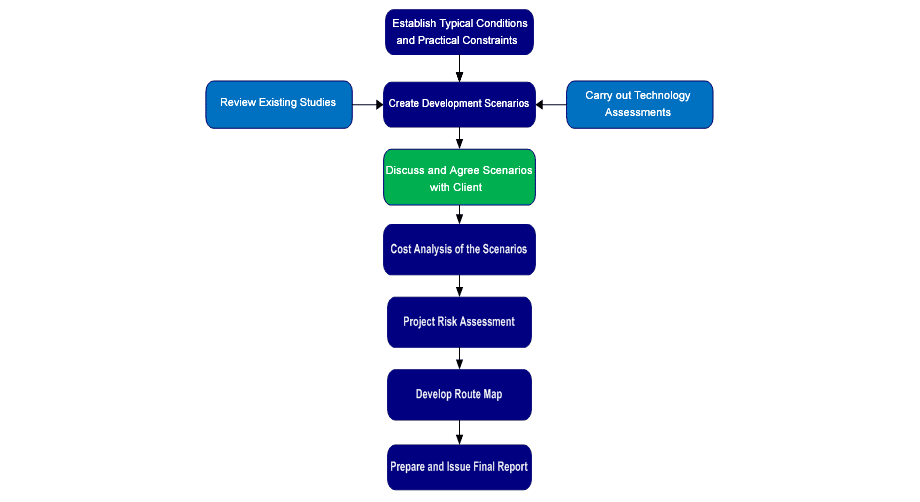
This approach leads to a clear understanding of the most appropriate type of tidal-stream turbines required for the available metocean resources and from which the scope of work for FEED is determined. We provide a robust, world-class project management service for renewable energy projects, fully supported by experienced and professional renewable industry project engineers.
We deal with the definition and selection of suitable sites, power-generation equipment, tendering, procurement management and factory acceptance testing, through to the offshore installation and commissioning phases through management of the operations and maintenance phase for life-of-asset assurance on behalf of utility companies, or as an Independent Power Producer.
TYPICAL CONCEPT DEFINITION SCOPE OF WORK
- Review previous studies, papers and relevant research that have been carried out for marine energy potential (including commercialisation studies) in the desired locations.
- Identify typically-required environmental conditions (e.g., tidal-flow, constricted-flow, and wave) through to review of existing data and publicly available information to allow the definition and development of realistic scenarios and early completion opportunities.
- Perform a technology study to establish the types of turbines that could be deployed and compile a list of potentially-approved suppliers.
- Using the results of the above, develop a number of typical development scenarios (e.g., cost, risk and schedule) for 12MW, 70MW and 150MW sites, namely:
- ‘Remote Locations’, e.g. island communities looking to reduce reliance on imported conventional fossil fuels.
- Developments adjacent to existing O&G (oil and gas) infrastructure, looking to take advantage of existing support and other facilities.
- Developments near existing utility company grid infrastructure.
- Perform a project risk assessment based on: the above scenarios; our knowledge/experience and lessons learned from similar commercial developments to transfer latest state-of-the-art knowledge and technologies to the project.
- Develop a Road Map for the development of ocean energy electrical power-generation turbines taking into account the above points.
- Produce a final report that presents a Road Map for the development of an ocean energy power-generation, multi-turbine project in the desired ocean locations including but not limited to:
- The different development scenarios available.
- Description of key risks and mitigation solutions.
- Schedule and cost.
- Engineering.
- Surveys.
- Consenting plan.
- Supply chain and procurement plan.
When you entrust your renewable energy project to SBS, you can rest assured that we take the ‘duty of responsibility’ seriously, pragmatically and enthusiastically. You will have our undivided attention at all times throughout the development phases and beyond, as well as access to over 600 highly qualified and experienced specialist engineers, safety professionals and scientists...
